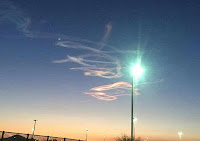The American Meteor Society has
received reports of a bright fireball meteor being seen over much of
the northwest of North America at about 11.55 pm local time on Friday 2 September 2016 (about 6.55 am on Saturday 3 September GMT).
The fireball was seen across Oregon, Washington and British Colombia, though the majority of sightings came from Oregon. A fireball is defined as a meteor
(shooting star) brighter than the
planet Venus. These are typically caused by pieces of rock burning up in
the atmosphere, but can be the result of man-made space-junk burning up
on re-entry.
Dashcam image of the 2 September 2016 Oregon fireball. Peter Burkhard/American Meteor Society.
Objects of this size probably enter the Earth's atmosphere several times a year, though unless they do so over populated areas they are unlikely to be noticed. They are officially described as fireballs if they produce a light brighter than the planet Venus. It is possible that this object will have produced meteorites that reached the surface (an object visible in the sky is a meteor, a rock that falls from the sky and can be physically held and examined is a meteorite).
Witness reports can help astronomers to understand these events. If you witnessed this fireball you can report it to the American Meteor Society here.
See also...
 The Perseid Meteors. The
Perseid Meteor shower lasts from late July to early September each
year, and are expected to be at a peak on Thursday 11- Friday12 August
2016. The Moon is expected to be quite bright on that night, however it
will be setting at about 1.00 am local...
The Perseid Meteors. The
Perseid Meteor shower lasts from late July to early September each
year, and are expected to be at a peak on Thursday 11- Friday12 August
2016. The Moon is expected to be quite bright on that night, however it
will be setting at about 1.00 am local... Fireball over Arizona. The American Meteor Society has
received reports of a bright fireball meteor being seen over much of
the southwest United States at about 4.00 am local time on Thursday 2
June 2016 (about 11.00 am GMT).
The fireball was seen across Arizona, Utah, New...
Fireball over Arizona. The American Meteor Society has
received reports of a bright fireball meteor being seen over much of
the southwest United States at about 4.00 am local time on Thursday 2
June 2016 (about 11.00 am GMT).
The fireball was seen across Arizona, Utah, New... The Eta Aquarid Meteors. The
Eta Aquarid Meteor Shower will peak before dawn on Thursday 5 and Friday 6
May 2016, with up to 45 meteors per hour at it's peak, radiating from
the constellation of Aquarius. This does not spend long above the
horizon in the Northern Hemisphere at...
The Eta Aquarid Meteors. The
Eta Aquarid Meteor Shower will peak before dawn on Thursday 5 and Friday 6
May 2016, with up to 45 meteors per hour at it's peak, radiating from
the constellation of Aquarius. This does not spend long above the
horizon in the Northern Hemisphere at... Follow Sciency Thoughts on Facebook.

